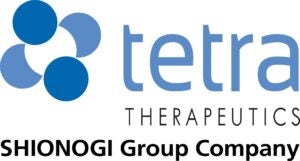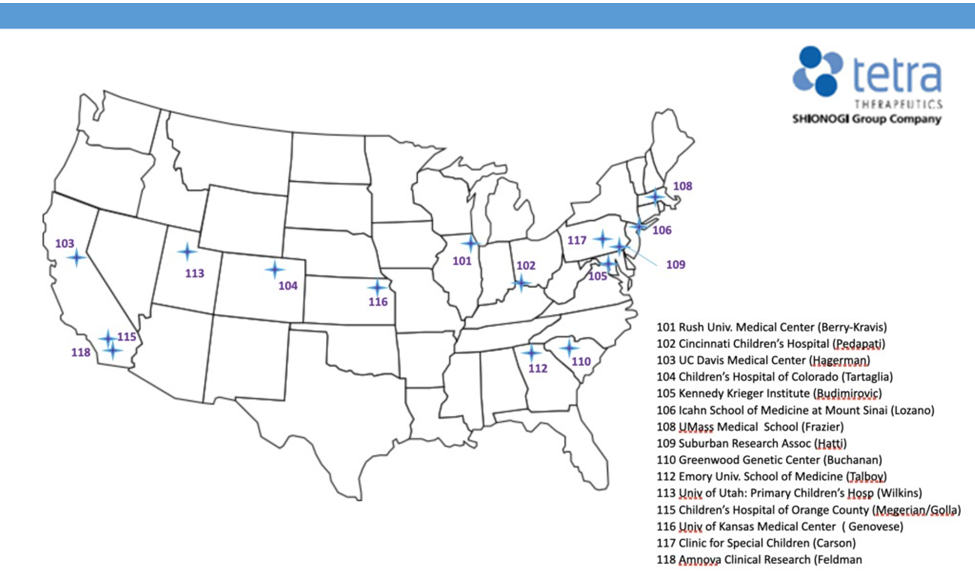Age 9–45 males with FXS with a molecular genetic confirmation FMR1 >200 CGG repetitions needed for clinical trials of new drug zatolmilast.

Tetra Therapeutics is conducting two randomized, placebo-controlled studies of BPN14770 (zatolmilast) to learn about the experimental drug’s safety and efficacy. Both trials will be followed by an open label extension study. If results are positive, Tetra will be seeking approval of the drug with the FDA.
One trial is for adolescent males ages 9 to <18 years old and the other trial is for adult males 18-45 years.
About the Study
Who can participate?
Males ages 9–45 may be eligible to participate with a molecular genetic confirmation of FXS: FMR1 >200 CGG repetitions.
What will happen in the study?
If the individual qualifies and decides to be in this research study, they will conduct eight visits (at clinic and at home) over 13 weeks.
The following is a list of some of the study procedures that will happen during the study:
- Participant cognitive and behavior testing
- Blood draws
- Parent/caregiver questionnaires
For more information, visit Tetra’s website.
What are the good things that can happen from this research?
Potential benefits are improvement in cognitive (language and vocabulary) function and improvement in daily activities/behavior.
What are the bad things that can happen from this research?
Potential drug side effects include mild nausea and diarrhea.
There may be other risks that we do not know about yet.
Will I or my child be paid to complete this study?
Participants receive $50 per visit (6).
Travel can be coordinated and paid for by Tetra or reimbursed for eligible families, even if there is not a site nearby.
Who can I contact for more information about this study?
There are several sites across the U.S. Complete the contact form below to notify the site nearest you!

| Site | Coordinator | Phone | |
|---|---|---|---|
| Rush University Medical Center (IL) | Lina Berman | Lina_Berman@rush.edu | 312-563-4925 |
| Cincinnati Children’s Hospital Medical Center (OH) | Jessie Michael | jessica.michael@cchmc.org | 513-517-1550 |
| UC Davis Health System (CA) | Abigail Higareda Borbe | amoradelhigareda@ucdavis.edu | 916-703-0281 |
| Children’s Hospital Colorado (CO) | Erika Peterson | erika.peterson@childrenscolorado.org | 720-777-8590 |
| Kennedy Krieger Institute (MD) | Maria Halaguena | halaguena@kennedykrieger.org | 443-923-3826 |
| Icahn School of Medicine at Mount Sinai (NY) | Venus Fan | venus.fan@mssm.edu | 929-989-7016 |
| University of Utah and Primary Children’s Hospital (UT) | Hina Yazdani | hina.yazdani@hsc.utah.edu | 801-581-7234 |
| University of Massachusetts Medical School (MA) | Taylor Merk | taylor.merk@umassmed.edu | 774-455-4119 |
| Suburban Research Associates (PA) | Augusto Sanchez | asanchez@suburbanresearch.com | 610-891-9024 x 1112 |
| Greenwood Genetic Center (SC) | Nicole Johnston | njohnston@ggc.org | 864-672-6896 |
| CHOC Thompson Autism Center (CA) | Mai Ngo | pngo@choc.org | 714-509-8300 x 32683 |
| Emory University School of Medicine (GA) | Jean Luan McColl | jean.luan@emory.edu | 404-778-8619 |
| University of Kansas Medical Center (KS) | Jasli Bonilla | jbonilla@kumc.edu | 913-945-9790 |
| Amnova Clinical Research (CA) | Maggie Wang | maggie@amnovaresearch.com | 323-348-0956 |
| Clinic for Special Children (PA) | Joelle Williamson | jwilliamson@clinicforspecialchildren.org | 717-687-9407 |
Interested in Participating?
Our Most Recent Opportunities
FXS TECH Study
Researchers at Rush University Medical Center are working on technology to improve how to identify and track progress in children living with autism and Fragile X syndrome. The study is currently recruiting children ages 18 months to 5 years, and 12-18 years.
Study: Web Intervention for Parents of Youth with Genetic Syndromes (WINGS)
Researchers at the Autism Assessment, Research, Treatment & Services (AARTS) Center at Rush University Medical Center are currently conducting a fully-virtual research study that is testing two telehealth interventions that are designed to help parents of children with genetic syndromes and intellectual disabilities gain strategies to manage challenging behaviors.
Neural Underpinnings of the Relationship Between Cognition and Gait Dysfunction in Fragile X-Associated Tremor/Ataxia Syndrome (FXTAS)
Movement disorders researchers at Rush University Medical Center are conducting a research study to learn about brain activation in people living with FXTAS during tasks like walking and thinking. This study is currently recruiting adults ages 50+ who are living with FXTAS.
Pharmacogenomics and the Fragile X Community: Interest and Prior Understanding
Researchers at the University of Alabama are looking for members of the FX community to take their online survey so they can explore the knowledge & opinions of the FXS community on pharmacogenomic testing.
Brain & Behavior Study
Researchers at Purdue University are conducting a natural history research study to learn about brain activity in females, ages18-60 years, living with the FMR1 premutation.
NFXF Gene Therapy Community Survey
Help the NFXF - share your thoughts on gene therapy.

